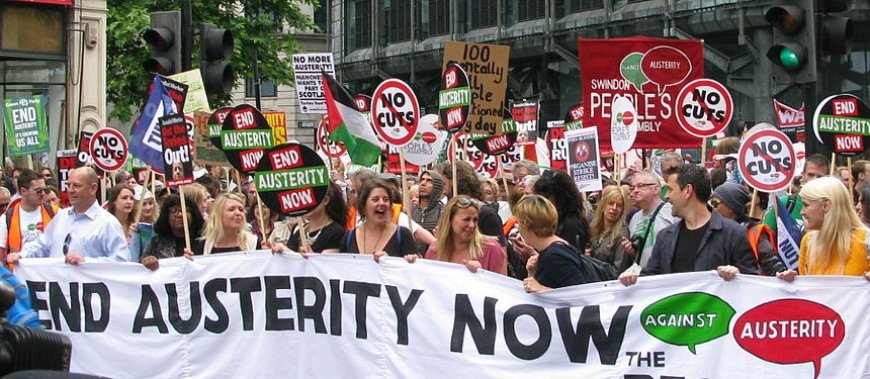Britain’s Austerity Crisis: A Nation on the Brink of Economic Despair
Compounding this turmoil is the government’s failure to rein in inflation. Volatile inflation figures, driven by surging energy, housing, and food prices, expose the futility of austerity as a tool to address systemic economic imbalances. Core inflation, rooted in these structural pressures, continues to erode purchasing power, leaving families to grapple with a silent thief stealing their financial security.

Britain’s Austerity Crisis: A Nation on the Brink of Economic Despair
The United Kingdom has entered an era of unprecedented economic strain, with austerity policies and shrinking state support unleashing a devastating toll on households between 2023 and 2025. According to the Resolution Foundation’s latest analysis, the average British household has suffered an annual income drop of £3,200 since 2022—the sharpest decline in living standards since records began. This collapse has disproportionately battered low- and middle-income families: By early 2025, 32% of households struggled to afford basic monthly expenses, a stark rise from 24% in 2022. Meanwhile, the erosion of social safety nets has plunged approximately 4.1 million children into poverty, painting a harrowing portrait of a nation in crisis.
Austerity as Ideology, Not Remedy
The government’s austerity agenda, initially framed as a remedy to post-2008 fiscal deficits and later extended post-COVID-19, has gutted funding for essential public services and welfare programs. This ideological pivot has left families stranded amid skyrocketing living costs, with dwindling state aid to cushion the blow. For ordinary earners, each cut to public spending translates to less money in pockets, exacerbating a cost-of-living catastrophe. Economists warn that such policies—far from stimulating growth—are suffocating household budgets, pushing millions below the poverty line.
Inflation Ignored, Families Punished
Compounding this turmoil is the government’s failure to rein in inflation. Volatile inflation figures, driven by surging energy, housing, and food prices, expose the futility of austerity as a tool to address systemic economic imbalances. Core inflation, rooted in these structural pressures, continues to erode purchasing power, leaving families to grapple with a silent thief stealing their financial security.
Lives Reduced to Survival, Not Living
The human cost of these policies transcends statistics. Small businesses, buckling under rising operational costs, pass burdens to consumers through higher prices. Families now shoulder crippling energy bills, soaring rents, and increased National Insurance contributions. Public fury has erupted into social unrest: 2024 saw the largest wave of industrial strikes since the 1980s, spanning healthcare, transport, and education sectors. The Cost of Living Action Coalition, representing over 50 civil society groups, documented more than 1,000 local protests between 2023 and early 2025, fueled by outrage over energy prices, housing unaffordability, and food inflation. Public trust in the government’s economic stewardship has cratered, with 72% of Britons deeming current policies inadequate to address the crisis.
Warnings Fall on Deaf Ears
Economists sound dire alarms: Without urgent fiscal recalibration, poverty rates among vulnerable groups will spiral. Experts argue that the dual assault of austerity and insufficient growth-oriented measures risks trapping swaths of society in a perpetual cycle of deprivation. Worse, this myopic focus on fiscal discipline over human welfare threatens to inflict lasting structural damage—stifling productivity, deepening inequality, and destabilizing the economy.
The Precipice: Collapse or Change
At its core, Britain’s crisis is a tinderbox of austerity dogma, unchecked inflation, and systemic neglect of household welfare. The government’s refusal to prioritize growth, domestic investment, and robust social protections risks consigning the UK to economic collapse. As inequality widens and social cohesion frays, the nation stands at a precipice. Only a radical shift—one that centers equitable growth, shields the vulnerable, and confronts inflation’s root causes—can avert a descent into prolonged recession and civil strife. The stakes could not be higher: For millions, survival itself hangs in the balance.
By: M. Mahdavi













































